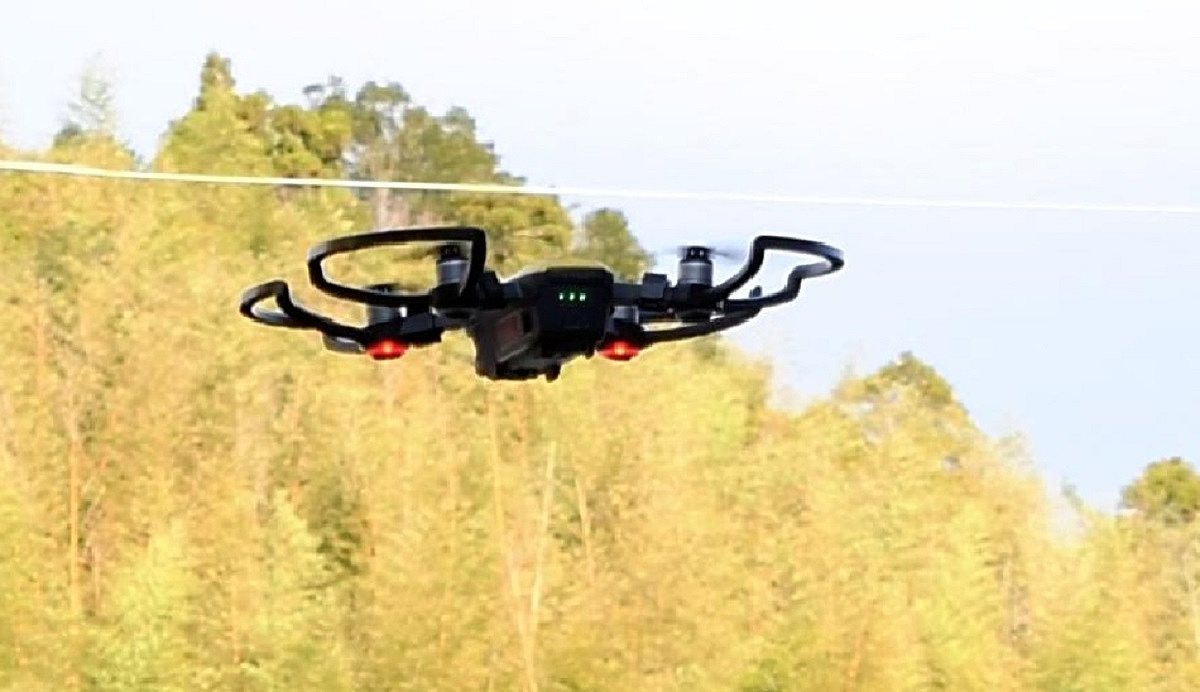
A drone
15:37 JST, February 7, 2021
The government plans to create a new system that would allow authorities who spot drones in the sky to receive information on the aircraft on mobile devices via radio waves, then immediately obtain data about the drone’s owner, permission to fly and other details, sources said.
With drone use rising, the goal is to confirm they are being flown properly and to enable authorities to quickly detect suspicious drones. The system is to be introduced as early as fiscal 2022, the sources said.
A revision to the Civil Aeronautics Law enacted in June will require drone owners to register their addresses, names, device serial numbers and other information with the Land, Infrastructure, Transport and Tourism Ministry. The revised law will be enforced by June 2022.
While drones must display a registration code like a car license plate, this is difficult to see from the ground. Therefore, the ministry plans to require that all drones be installed with a device that transmits this registration code and other data via radio waves.
Under the new system, when a police officer, coast guard officer, supervisor at an important state facility or other official spots a drone in the sky, the radio waves it emits could be received by mobile devices.
Using the registration code displayed on the device, the official could inquire with the government about the drone’s owner, whether it has permission to fly and other details. Data on the aircraft’s position could also be received over radio waves, allowing officials to make sure it matches the approved flight route.
The National Police Agency was allocated funds to develop a reception system in the third supplementary budget for fiscal 2020, which was approved last month.
Mobile devices would be distributed on a priority basis to important state facilities, such as the Imperial Palace, Diet and Prime Minister’s Office, as well as to police officers and other officials in charge of security at places like airports and foreign diplomatic missions.
The system is being introduced because of the rapid spread of drones.
Under the Civil Aeronautics Law and other regulations, permission or approval from the government is required to fly drones over densely populated residential areas such as Tokyo’s 23 wards, around airports and over event sites.
The number of applications for permits and approvals doubled from 19,795 in fiscal 2017 to 48,364 in fiscal 2019. Drones have a wide range of uses, including spraying pesticides, transporting materials and inspecting equipment.
However, unauthorized flights occur constantly, and there are concerns drones could be used for malicious purposes, such as terrorism.
In April 2015, a drone carrying radioactive material landed on the roof of the Prime Minister’s Office. In October and November 2019, runways at Kansai International Airport were closed when suspicious drones were sighted, delaying more than 100 flights.
In the future, the government plans to create a safety certification system to ensure the safety of the sky, such as by obliging drone users to maintain their aircraft and having manufacturers report any design defects to the government.
Top Articles in Society
-

Man Infected with Measles Reportedly Dined at Restaurant in Tokyo Station
-

Man Infected with Measles May Have Come in Contact with Many People in Tokyo, Went to Store, Restaurant Around When Symptoms Emerged
-

Woman with Measles Visited Hospital in Tokyo Multiple Times Before Being Diagnosed with Disease
-

Australian Woman Dies After Mishap on Ski Lift in Nagano Prefecture
-

Foreign Snowboarder in Serious Condition After Hanging in Midair from Chairlift in Nagano Prefecture
JN ACCESS RANKING
-

Japan PM Takaichi’s Cabinet Resigns en Masse
-

Japan Institute to Use Domestic Commercial Optical Lattice Clock to Set Japan Standard Time
-

Israeli Ambassador to Japan Speaks about Japan’s Role in the Reconstruction of Gaza
-

Man Infected with Measles Reportedly Dined at Restaurant in Tokyo Station
-

Videos Plagiarized, Reposted with False Subtitles Claiming ‘Ryukyu Belongs to China’; Anti-China False Information Also Posted in Japan






















